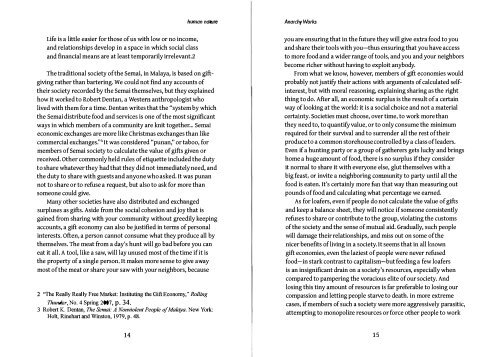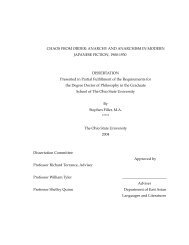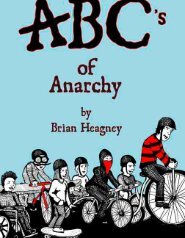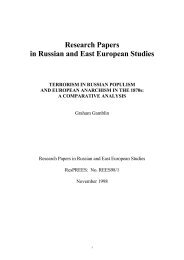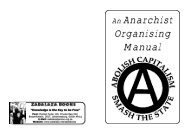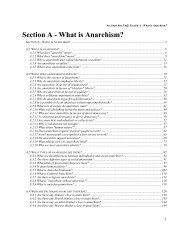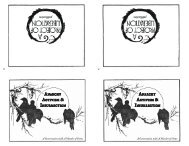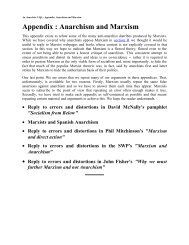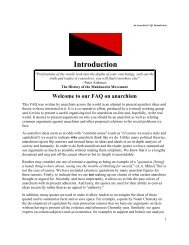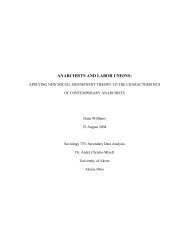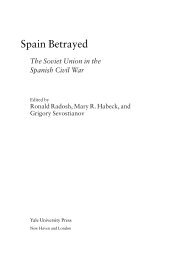Anarchy Works.pdf - Infoshop.org
Anarchy Works.pdf - Infoshop.org
Anarchy Works.pdf - Infoshop.org
You also want an ePaper? Increase the reach of your titles
YUMPU automatically turns print PDFs into web optimized ePapers that Google loves.
human nature<br />
<strong>Anarchy</strong> <strong>Works</strong><br />
Life is a little easier for those of us with low or no income,<br />
and relationships develop in a space in which social class<br />
and financial means are at least temporarily irrelevant.2<br />
The traditional society of the Serna!, in Malaya, is based on giftgiving<br />
rather than bartering. We could not find any accounts of<br />
their society recorded by the Semai themselves, but they explained<br />
how it worked to Robert Dentan, a Western anthropologist who<br />
lived with them for a time. Dentan writes that the "system by which<br />
the Semai distribute food and services is one of the most significant<br />
ways in which members of a community are knit together ... Sema!<br />
economic exchanges are more like Christmas exchanges than like<br />
commercial exchanges.'" It was considered "punan;' or taboo, for<br />
members of Semai society to calculate the value of gifts given or<br />
received. Other commonly held rules of etiquette included the duty<br />
to share whatever they had that they did not immediately need, and<br />
the duty to share with guests and anyone who asked. It was punan<br />
not to share or to refuse a request, but also to ask for more than<br />
someone could give.<br />
Many other societies have also distributed and exchanged<br />
surpluses as gifts. Aside from the social cohesion and joy that is<br />
gained from sharing with your community without greedily keeping<br />
accounts, a gift economy can also be justified in terms of personal<br />
interests. Often, a person cannot consume what they produce all by<br />
themselves. The meat from a day's hunt will go bad before you can<br />
eat it all. A tool, like a saw, will lay unused most of the time if it is<br />
the property of a single person. It makes more sense to give away<br />
most of the meat or share your saw with your neighbors, because<br />
2 "The Really Really Free Market: Instituting the Gift Economy,» Rolling<br />
Thunder, No.4 Spring 2007, p. 34.<br />
3 Robert K. Dentan, The Semai: A Nonviolent People a/Malaya. New York:<br />
Holt, Rinehart and Winston, 1979, p. 48.<br />
you are ensuring that in the future they will give extra food to you<br />
and share their tools with you-thus ensuring that you have access<br />
to more food and a wider range of tools, and you and your neighbors<br />
become richer without having to exploit anybody.<br />
From what we know, however, members of gift economies would<br />
probably not justify their actions with arguments of calculated selfinterest,<br />
but with moral reasoning, explaining sharing as the right<br />
thing to do. After all, an economic surplus is the result of a certain<br />
way of looking at the world: it is a social choice and not a material<br />
certainty. Societies must choose, over time, to work more than<br />
they need to, to quantify value, or to only consume the minimum<br />
required for their survival and to surrender all the rest of their<br />
produce to a common storehouse controlled by a class of leaders.<br />
Even if a hunting party or a group of gatherers gets lucky and brings<br />
home a huge amount of food, there is no surplus if they consider<br />
it normal to share it with everyone else, glut themselves with a<br />
big feast, or invite a neighboring community to party until all the<br />
food is eaten. It's certainly more fun that way than measuring out<br />
pounds of food and calculating what percentage we earned.<br />
As for loafers, even if people do not calculate the value of gifts<br />
and keep a balance sheet, they will notice if someone consistently<br />
refuses to share or contribute to the group, violating the customs<br />
of the SOciety and the sense of mutual aid. Gradually, such people<br />
will damage their relationships, and miss out on some of the<br />
nicer benefits of llving in a society. It seems that in all known<br />
gift economies, even the laziest of people were never refused<br />
food-in stark contrast to capitalism-but feeding a few loafers<br />
is an insignificant drain on a society's resources, especially when<br />
compared to pampering the voracious elite of our society. And<br />
losing this tiny amount of resources is far preferable to losing our<br />
compassion and letting people starve to death. In more extreme<br />
cases, if members of such a society were more aggressively parasitic,<br />
attempting to monopolize resources or force other people to work<br />
14<br />
15


